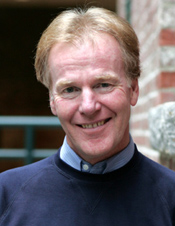Peter Senge - Founding Chairperson - Society for Organizational Learning
 Dr.
Peter M. Senge is the founding chairperson of SoL and a senior lecturer
at the Massachusetts Institute of Technology. Dr. Senge is the author
of The Fifth Discipline: the Art and Practice of the Learning Organization.
He has lectured extensively throughout the world, translating the abstract
ideas of systems theory into tools for better understanding of economic
and organizational change. He has worked with leaders in business, education,
health care and government. The Journal of Business Strategy (September/October
1999) named Dr. Senge as one of the 24 people who had the greatest influence
on business strategy over the last 100 years.
Dr.
Peter M. Senge is the founding chairperson of SoL and a senior lecturer
at the Massachusetts Institute of Technology. Dr. Senge is the author
of The Fifth Discipline: the Art and Practice of the Learning Organization.
He has lectured extensively throughout the world, translating the abstract
ideas of systems theory into tools for better understanding of economic
and organizational change. He has worked with leaders in business, education,
health care and government. The Journal of Business Strategy (September/October
1999) named Dr. Senge as one of the 24 people who had the greatest influence
on business strategy over the last 100 years.
Excerpt from the interview: [ Read the full interview here ]
Prasad: When did you come alive in your own life and get to know yourself better?
Peter: I had a chance to facilitate a Leadership & Mastery workshop through ‘Innovation Associates’. It was a really good time for me. I was probably just about 30 years old. I had done all this study and I had a great partnership that developed with Charlie Kiefer and Robert Fritz who were very different people. Charlie is an expert consultant (which I had never really considered myself to be) and Robert is such an interesting and unusual thinker about the creative process.
This ‘systems thinking’ approach was brewing in me. The first time we designed the program, we spent time together for four days. We began with all of us playing at the Charlie’s pool for an afternoon and identifying the outcomes. Charlie told me that I had to do some work during a certain period of time; we had a schedule but no content. The process was a metaphor and a practical context to do it again.
I vividly remember one particular exercise known as the ‘choice exercise’ that Robert introduced and we participated and that got etched in my mind. One of those choices – “being an observer”- just made me think and ponder for a while. It just crystallized in my mind as a choice from that time on. It became an interesting observer process. After so many years, I don’t really think about it, but I really observe myself when I talk. There is this Peter who is talking and one who is observing. It is kind of a binocular vision. You have to be in yourself talking, and also have that awareness of standing to the side of yourself. I think part of it is not being attached to your self. We all started to kind of disassociate ourselves from our mind strategies -- like if I do this, this will happen as opposed to just being present and saying whatever happens is fine. It is about really supporting our intentions and supporting people who are there.
I learned during that time that whenever I get really confused or sad or discouraged, I would just make the choice to be of service to other people and forget about everything else. So I kind of developed this trust that it was all coming back to paying attention to what was going on and be clear about my choice to be of service, and I think it takes care of itself.